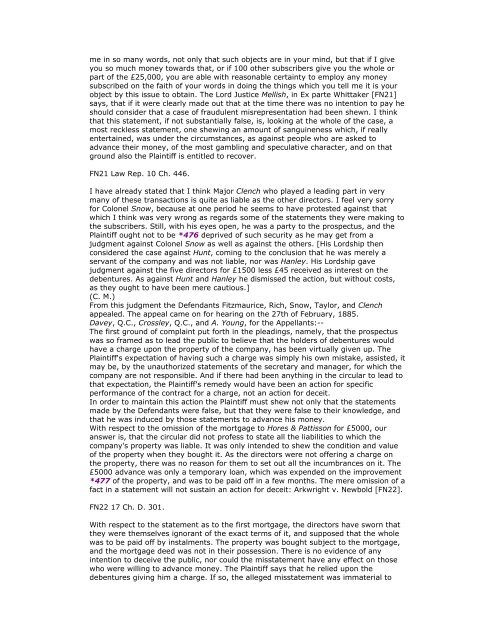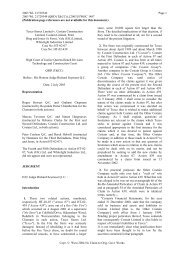Edington v Fitzmaurice - Thomson Reuters
Edington v Fitzmaurice - Thomson Reuters
Edington v Fitzmaurice - Thomson Reuters
You also want an ePaper? Increase the reach of your titles
YUMPU automatically turns print PDFs into web optimized ePapers that Google loves.
me in so many words, not only that such objects are in your mind, but that if I giveyou so much money towards that, or if 100 other subscribers give you the whole orpart of the £25,000, you are able with reasonable certainty to employ any moneysubscribed on the faith of your words in doing the things which you tell me it is yourobject by this issue to obtain. The Lord Justice Mellish, in Ex parte Whittaker [FN21]says, that if it were clearly made out that at the time there was no intention to pay heshould consider that a case of fraudulent misrepresentation had been shewn. I thinkthat this statement, if not substantially false, is, looking at the whole of the case, amost reckless statement, one shewing an amount of sanguineness which, if reallyentertained, was under the circumstances, as against people who are asked toadvance their money, of the most gambling and speculative character, and on thatground also the Plaintiff is entitled to recover.FN21 Law Rep. 10 Ch. 446.I have already stated that I think Major Clench who played a leading part in verymany of these transactions is quite as liable as the other directors. I feel very sorryfor Colonel Snow, because at one period he seems to have protested against thatwhich I think was very wrong as regards some of the statements they were making tothe subscribers. Still, with his eyes open, he was a party to the prospectus, and thePlaintiff ought not to be *476 deprived of such security as he may get from ajudgment against Colonel Snow as well as against the others. [His Lordship thenconsidered the case against Hunt, coming to the conclusion that he was merely aservant of the company and was not liable, nor was Hanley. His Lordship gavejudgment against the five directors for £1500 less £45 received as interest on thedebentures. As against Hunt and Hanley he dismissed the action, but without costs,as they ought to have been mere cautious.](C. M.)From this judgment the Defendants <strong>Fitzmaurice</strong>, Rich, Snow, Taylor, and Clenchappealed. The appeal came on for hearing on the 27th of February, 1885.Davey, Q.C., Crossley, Q.C., and A. Young, for the Appellants:--The first ground of complaint put forth in the pleadings, namely, that the prospectuswas so framed as to lead the public to believe that the holders of debentures wouldhave a charge upon the property of the company, has been virtually given up. ThePlaintiff's expectation of having such a charge was simply his own mistake, assisted, itmay be, by the unauthorized statements of the secretary and manager, for which thecompany are not responsible. And if there had been anything in the circular to lead tothat expectation, the Plaintiff's remedy would have been an action for specificperformance of the contract for a charge, not an action for deceit.In order to maintain this action the Plaintiff must shew not only that the statementsmade by the Defendants were false, but that they were false to their knowledge, andthat he was induced by those statements to advance his money.With respect to the omission of the mortgage to Hores & Pattisson for £5000, ouranswer is, that the circular did not profess to state all the liabilities to which thecompany's property was liable. It was only intended to shew the condition and valueof the property when they bought it. As the directors were not offering a charge onthe property, there was no reason for them to set out all the incumbrances on it. The£5000 advance was only a temporary loan, which was expended on the improvement*477 of the property, and was to be paid off in a few months. The mere omission of afact in a statement will not sustain an action for deceit: Arkwright v. Newbold [FN22].FN22 17 Ch. D. 301.With respect to the statement as to the first mortgage, the directors have sworn thatthey were themselves ignorant of the exact terms of it, and supposed that the wholewas to be paid off by instalments. The property was bought subject to the mortgage,and the mortgage deed was not in their possession. There is no evidence of anyintention to deceive the public, nor could the misstatement have any effect on thosewho were willing to advance money. The Plaintiff says that he relied upon thedebentures giving him a charge. If so, the alleged misstatement was immaterial to
















